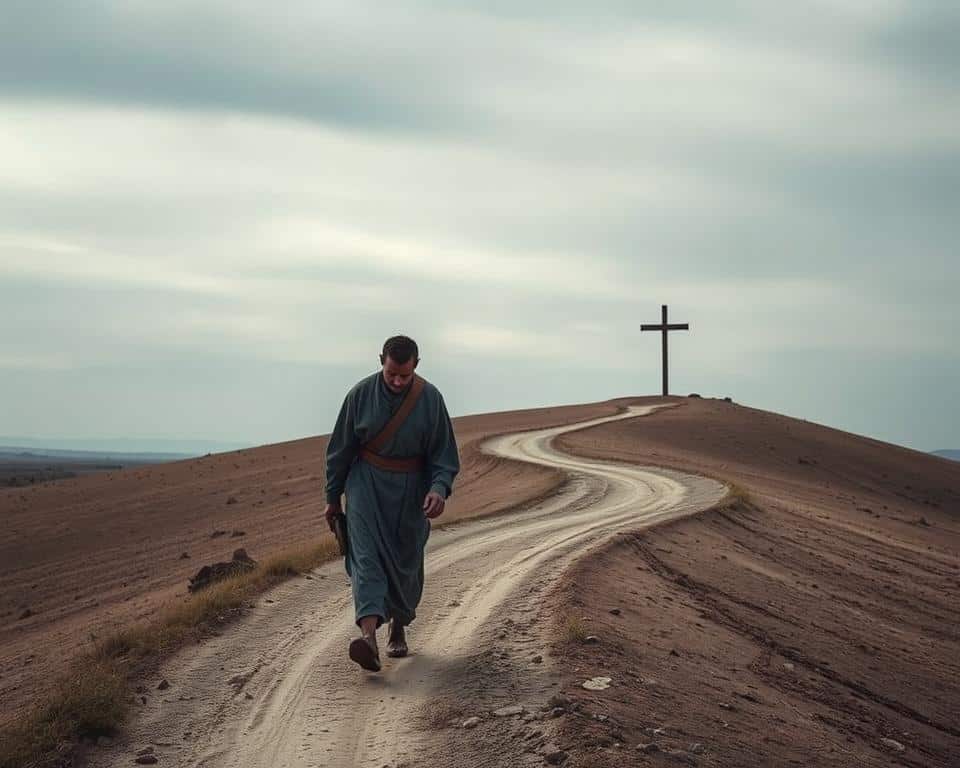Jesus’ teachings on discipleship challenge believers to live with total commitment. In Luke 9:23, He calls us to deny ourselves, take up our cross daily, and follow Him. This isn’t a casual invitation but a call to sacrificial living. Dietrich Bonhoeffer described it as a call to “come and die,” emphasizing the depth of surrender required.
Matthew 16:24-26 reinforces this message, reminding us that gaining the world means nothing if we lose our soul. Discipleship isn’t about comfort but about aligning our lives with God’s will. It’s a journey of faith, grace, and unwavering trust in Jesus.
Today, many face challenges in fully embracing this call. Yet, Jesus’ words remain clear and relevant. By understanding His teachings, we can take practical steps to live out our faith with purpose and dedication.
Introduction to “The Cost of Discipleship”
In the midst of Nazi Germany, Dietrich Bonhoeffer’s faith stood as a beacon of resistance. His life and writings continue to inspire believers to live with radical obedience to Jesus. Bonhoeffer’s work, particularly his book, remains a cornerstone for understanding what it means to follow Christ in challenging times.

Overview of Dietrich Bonhoeffer’s Work
Dietrich Bonhoeffer was a Lutheran pastor who boldly opposed the Nazi regime. His book, originally titled “Nachfolge” (meaning “following”), was published in 1937. It explores themes like the Sermon on the Mount and the difference between cheap and costly grace. Bonhoeffer’s theology was shaped by the persecution he witnessed, urging believers to live out their faith with courage.
Historical Context of the Book
During the rise of Nazi Germany, Bonhoeffer saw the church compromise its values. This led him to write about the dangers of cheap grace—grace without discipleship. His book was translated into English in 1951 by John W. Doberstein, making it accessible to a wider audience. Bonhoeffer’s martyrdom in 1945 stands in stark contrast to the safe Christianity many practice today.
“Cheap grace is the grace we bestow on ourselves. Costly grace is the gospel which must be sought again and again.”
Bonhoeffer’s life challenges us to examine our own faith. Are we willing to follow Jesus, no matter the cost? His book remains a timeless call to radical discipleship, urging the church to live out its calling with integrity and courage.
Understanding the Cost of Discipleship
True discipleship is a call to live differently, rooted in faith. It’s not about convenience but about aligning your life with God’s will. Jesus’ teachings challenge us to take up our cross daily and follow Him. This isn’t a passive choice; it’s an active commitment to obedience. True discipleship also requires perseverance in the face of trials and an unwavering dedication to spreading love and grace. As we embrace Jesus’ teachings on discipleship in the gospels, we are reminded that each step we take in faith shapes our character and brings us closer to God’s purpose for our lives. It calls us to serve others selflessly, reflecting the heart of Christ in our daily actions.

Jesus’ Teachings on Discipleship
In Mark 8:34, Jesus says, “If anyone would come after Me, let him deny himself and take up his cross and follow Me.” This command is clear. It’s a call to surrender your desires and embrace God’s plan. The cross symbolizes sacrifice, reminding us that discipleship isn’t easy but it’s worth it.
Matthew 5-7, often called the Sermon on the Mount, provides practical applications. Jesus teaches about love, forgiveness, and humility. These principles aren’t just ideals; they’re a roadmap for living out your faith daily.
Bonhoeffer’s Interpretation of Jesus’ Call
Dietrich Bonhoeffer understood this call deeply. He wrote, “Discipleship means adherence to Christ.” For Bonhoeffer, following Jesus wasn’t about rituals or empty traditions. It was about heart transformation and living out your faith authentically.
Bonhoeffer rejected the idea of “cheap grace,” which he saw as grace without discipleship. In his prison letters, he showed what it means to live out faith even in the hardest circumstances. His life challenges us to examine our own commitment to Christ.
“Cheap grace is the grace we bestow on ourselves. Costly grace is the gospel which must be sought again and again.”
Here are three questions to evaluate your personal commitment:
- Are you willing to deny yourself and take up your cross daily?
- Is your faith transforming your heart and actions?
- How are you living out the principles of the Sermon on the Mount?
Discipleship is a journey, but it’s one that leads to a deeper relationship with Christ. Are you ready to answer His call?
Cheap Grace vs. Costly Grace
Grace is central to faith, but not all grace is the same. Dietrich Bonhoeffer, a Lutheran pastor, distinguished between two types: cheap grace and costly grace. His insights challenge us to examine how we live out our faith.
Definition of Cheap Grace
Cheap grace is forgiveness without repentance. Bonhoeffer described it as “communion without confession.” It’s grace we give ourselves, often without true transformation. This approach can lead to a shallow faith, disconnected from the teachings of Jesus Christ.
In modern church practices, cheap grace might look like attending services without applying God’s word to daily life. It’s a passive acceptance of grace without the commitment to follow Jesus fully.
Definition of Costly Grace
Costly grace, on the other hand, demands lifelong obedience. Bonhoeffer called it the “yoke of Christ,” referencing Matthew 11:30. It’s grace that requires surrender, sacrifice, and a daily commitment to live according to God’s will.
This type of grace transforms hearts and actions. It’s not about rituals but about a deep, personal relationship with Jesus. Costly grace challenges us to deny ourselves and take up our cross daily.
Bonhoeffer’s Critique of Cheap Grace
Bonhoeffer strongly opposed cheap grace, seeing it as a danger to the church. He believed it led to a faith without discipleship, where people claimed grace without living it out. His critique remains relevant today, as many still struggle with this issue.
Monasticism, for example, failed to model grace for all believers. It created a divide between “holy” and “ordinary” lives, missing the call for everyone to live out costly grace. Modern churches must avoid similar pitfalls by encouraging active, transformative faith.
“Cheap grace is the grace we bestow on ourselves. Costly grace is the gospel which must be sought again and again.”
Here are two Bible study methods to help you discern between cheap grace and costly grace:
- Reflect on Matthew 11:30: Study Jesus’ invitation to take His yoke. Ask yourself if your faith involves surrender and obedience.
- Examine the Sermon on the Mount: Focus on Matthew 5-7. Identify practical ways to live out costly grace in your daily life.
Grace without discipleship weakens faith. By embracing costly grace, you can deepen your relationship with Jesus and live out His teachings with purpose.
The Sermon on the Mount and Discipleship
The Sermon on the Mount remains one of Jesus Christ’s most profound teachings, calling believers to a life of radical discipleship. Dietrich Bonhoeffer saw these words as a direct challenge to live differently in a broken world. His analysis of Matthew 5-7 offers timeless insights for those seeking to follow Jesus Christ with integrity.
Bonhoeffer’s Analysis of Matthew 5-7
Bonhoeffer described the Beatitudes as “a call to sacrifice.” He believed Jesus’ teachings were not just ideals but a blueprint for discipleship. For example, “turning the other cheek” wasn’t about passivity but about resisting evil with love. Bonhoeffer applied this principle during Nazi resistance, showing how faith could confront injustice without violence.
He also emphasized mercy and purity of heart as antidotes to materialism. In a world obsessed with wealth and status, Bonhoeffer urged believers to prioritize God’s kingdom. His book remains a powerful reminder that discipleship requires courage and commitment.
Practical Applications for Today
How can we live out the Sermon on the Mount in modern life? Here are four ways to apply its ethics:
- Digital Interactions: Practice kindness and truthfulness online, avoiding gossip and negativity.
- Conflict Resolution: Seek reconciliation in disagreements, embodying Jesus’ call to peacemaking.
- Social Justice: Advocate for the marginalized, reflecting God’s heart for justice.
- Youth Ministry: Teach young people to live out these principles through service and humility.
Bonhoeffer’s life and writings challenge us to take Jesus’ words seriously. Are you ready to embrace the call to discipleship in your daily life?
Strengths of “The Cost of Discipleship”
Bonhoeffer’s work bridges historical challenges with modern faith struggles. His insights remain a powerful guide for believers seeking to live out their faith authentically. The book’s blend of deep theology and practical application makes it a timeless resource.
Relevance to Modern Christianity
Bonhoeffer’s anti-Nazi stance offers a model for today’s cultural battles. His courage in standing against injustice inspires believers to confront modern challenges with faith and integrity. The book’s themes of surrender and obedience resonate deeply in a world often focused on self-interest.
With a 4.7/5 rating from over 2,000 Amazon reviews, readers consistently praise its relevance. One pastor shared, “This book revitalized our church’s focus on discipleship. It’s a must-read for anyone serious about following Jesus.”
Accessibility and Clarity of the Book
Despite its deep theology, the book is written for laypeople. Bonhoeffer uses Scripture as the primary authority, making it accessible to all readers. Its clear language and practical examples help believers apply its teachings to daily life.
It’s widely used in seminary curricula and small groups, fostering deeper understanding of faith. Here are three discussion questions for group study:
- How does Bonhoeffer’s definition of grace challenge your current understanding?
- What practical steps can you take to live out costly grace in your community?
- How does the book inspire you to confront cultural challenges with faith?
Bonhoeffer’s work continues to guide believers toward a deeper, more authentic faith. Are you ready to embrace its call to discipleship?
Weaknesses of “The Cost of Discipleship”
Dietrich Bonhoeffer’s work remains influential, but it’s not without its challenges for modern readers. While its message is timeless, some aspects can feel distant or difficult to apply in today’s context. Understanding these barriers can help you engage with the book more effectively.
Cultural and Historical Barriers
Bonhoeffer wrote in 1937 Germany, a time and place vastly different from today. For many readers, visualizing pre-WWII church structures can be challenging. The historical context is crucial, but it can also create a disconnect.
To bridge this gap, consider companion resources like Eberhard Bethge’s biography of Bonhoeffer. These materials provide deeper insights into the era, helping you grasp the book’s full meaning.
Challenges for Modern Readers
Long chapters and dense theology can deter casual reading. Some find Bonhoeffer’s language on obedience “absolutist,” making it hard to relate to their daily lives. Yet, these challenges can be overcome with the right approach.
Here are three tips for engaging with the book:
- Break it down: Read smaller sections daily to absorb its depth without feeling overwhelmed.
- Compare with modern works: Books like David Platt’s “Radical” offer similar themes in a contemporary style.
- Discuss with others: Join a study group to share insights and gain new perspectives.
Bonhoeffer’s call to discipleship is powerful, but it’s not always easy to apply in today’s world. By addressing these challenges, you can find a way to embrace its message more fully. The cost following Jesus is high, but the rewards are eternal.
Why Youth Ministers Should Read This Book
Youth pastors play a vital role in shaping the faith of the next generation, and Bonhoeffer’s teachings offer invaluable insights for this mission. His emphasis on community, accountability, and costly grace provides a roadmap for nurturing young believers. By integrating these principles into your ministry, you can help teens build a deeper, more authentic relationship with Jesus.
Lessons for Youth Ministry
Bonhoeffer’s focus on community accountability can transform youth groups. Start by outlining a 5-week program using core chapters from his book. Each session can explore themes like surrender, obedience, and living out faith in daily life. For example, one SDA youth group applied costly grace to social media use, encouraging teens to post with integrity and kindness.
Mentoring strategies inspired by Bonhoeffer’s “life together” concepts can also strengthen relationships. Pair teens with mentors who model faith and guide them in applying Scripture to challenges like peer pressure. Role-play scenarios can help them practice biblical responses in real-life situations.
Building Stronger Faith Communities
Strong faith communities start with intentional discipleship. Use Bonhoeffer’s teachings to create small group guides that encourage accountability and growth. These resources can help teens discuss tough topics and support one another in following Jesus.
Here are three steps to build a thriving youth ministry:
- Focus on relationships: Encourage teens to connect deeply with peers and mentors.
- Apply Scripture practically: Use Bible study to address real-life challenges.
- Model costly grace: Show teens what it means to live out faith with sacrifice and commitment.
Bonhoeffer’s insights are timeless. By applying them, you can help teens embrace a faith that transforms their lives and communities.
Final Thoughts on Following Jesus
Living out faith requires daily surrender and unwavering trust in Jesus. His call to take up your cross is a reminder that discipleship isn’t easy, but it’s deeply rewarding. Dietrich Bonhoeffer’s words, “Costly grace is the sanctuary of God,” challenge us to embrace this journey with courage.
Here are three key takeaways: First, deny yourself and follow Jesus wholeheartedly. Second, let grace transform your heart and actions. Third, live out obedience in every area of life. These steps help you align with God’s will and deepen your faith.
Consider joining a Bible-based accountability group to grow in community. Pray for the strength to live out costly grace daily. To help you on this journey, we’re offering a free eBook study guide—click below to access it.
Jesus stands at the door and knocks, inviting you to a deeper commitment. As Revelation 3:20 says, “If anyone hears My voice and opens the door, I will come in.” Are you ready to answer His call?





